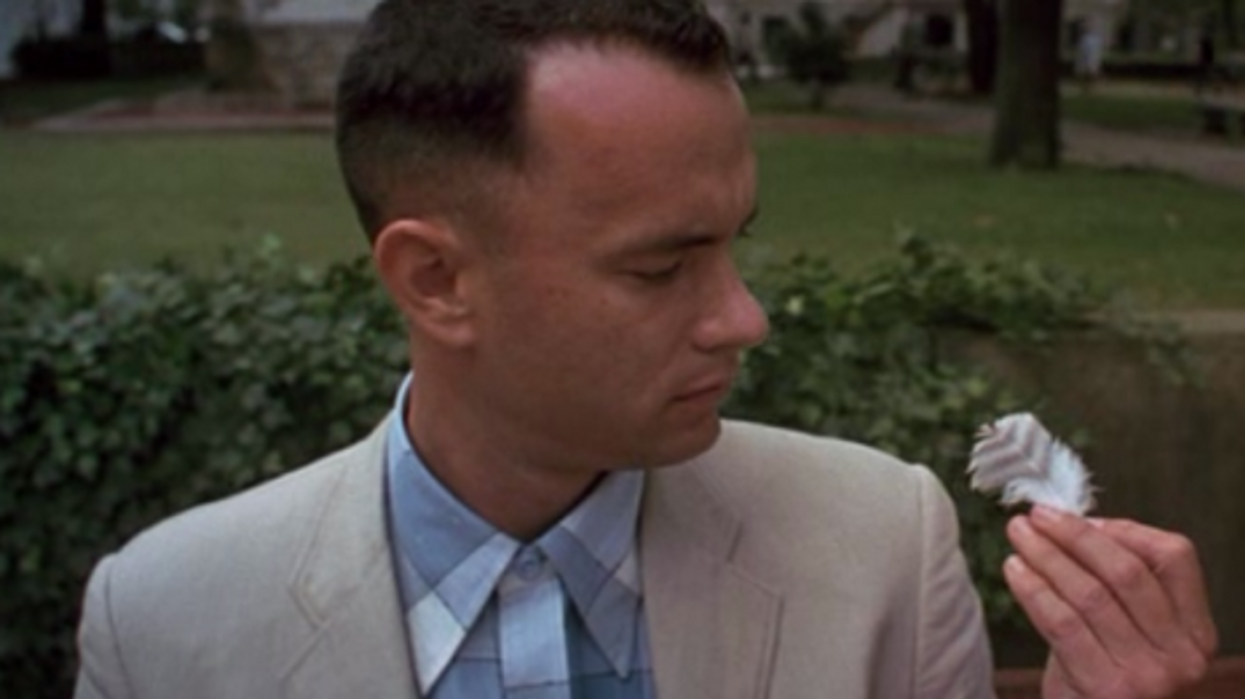What Does the Feather Mean in 'Forrest Gump'?
Is life random? Predestined? Is there a point to any of it? Maybe. And maybe "Forrest Gump" has all the answers, too...

It's been 25 years since Forrest Gump graced the silver screen. It was a complicated movie that addressed some of the most important events of the 20th century, as well as some of America's biggest scars. The movie had a lot to say, but not all of its messages were overt.
I love looking at the motifs and themes in cinema because there is so much to glean. One of the first things that caught my eye when analyzing movies was the symbolism of the feather motif in Forrest Gump.
Today we're going to talk about that feather, about life, taking chances, and why said feather should be an inspiration for you as you navigate your own filmmaking journey.
Check out this video from The Take and let's talk more about it after!
Do you make your own destiny or are we all just floating around in the breeze?
Forrest Gump opens with a feather falling from the sky and being tossed around in the wind. This feather becomes part of the greater metaphor of Forrest's life and the events we see on screen. He's a man who happens to be involved in or at the center of every major cultural moment from the 50s through the 80s.

While this adaptation of the novel takes twists and turns not presented in the book, it focuses on talking about two big theories:
1. Is our life full of predestined moments?
2. Is our life a series of random events?
Both these questions are embodied by the feather in the opening of the movie.
So...do you think the feather comes to Forrest at random, or do you think a higher power sent it to Forrest to be used as his "Curious George" bookmark?
What does Forrest believe?
Films are created for the point of view of the characters and the people behind those characters. So when Eric Roth and Robert Zemekis got together to adapt this book, they had to take into account their own ideas and put it on the screen. While I don't know their exact strategy, I think you can make the case these guys want the movie to espouse the belief in a higher power.
The scenes with Lieutenant Dan challenging god, the fact that the feather blends into heaven at the end of the movie, and Forrest's mom folksy ways all seem to push the story this way.
Even the moments that mock god, like Young Forrest hearing the "oh gods" of sex and Dan wanting to die, are undercut by the purity of Forrest. Much like Jesus, he saves everyone around him, even the hardest cases. When Forrest enters your life, the purity in him helps ease your pain and fix your problems.
He's a guy named after a KKK founder, living a life that puts his namesake to shame.
Life is a box of chocolates
Even with all that evidence, the core of Forrest Gump is the saying he and his mother repeated over and over again.
"Life is like a box of chocolates..."
That means both of them are led to believe that life is delivered at random. You make choices, but you have no idea what those choices will reap.
Even the feather reflects that. It's a feather brushed away by everyone except Gump. Is that inanimate object predestined? No, it's just a thing blowing around at random.
That means Gump also houses itself in the randomness of the world. Sometimes the wind blows you around and no one reacts. Sometimes they do. The times they do become part of your story. Narratively, we see those elements in Forrest Gump, but that's only because movies need things to happen.
But what about all that divine stuff I said earlier?

So how can both the divine and random coincide within the film?
What makes Gump so special is that the movie doesn't push one version of reality. It lets you reflect on your own. By putting Forrest in situations that can feel random or divine, the movie makes itself accessible to viewers of either mindset without sacrificing the power of each moral.
The movie does this by making the central question, the central theme, "How do we deal with chance elements?"
Forrest's life, whether predestined or not, is surrounded by difficult decisions and scenarios. Forrest always promises to do the right thing, and no matter what happens, that's what he does. This constant "do-gooding" is hard to emulate. It drives Lt. Dan crazy, pushes Jenny away, and even gets Forrest in a rut where he just can't stop running.
In the end, it doesn't matter what you believe, it matters what you do. No matter where the situation blows you, make sure you act with grace and common decency. Even if it hurts.
How does any of this apply to Hollywood?
Forrest's story is really a collection of stories that come into his life. I like to think about writing in the same way. There are stories we feel called to tell, and ones that just come across our desk and need an extra set of eyes.
No matter how this stuff gets to you, treat each story with tender love and care. You never know when your next masterpiece will blow into your life or what the box of ideas holds, but if you put in your best effort, it doesn't matter how the idea gets here.
It matters what you do with it.
So get writing.
What's next? Is Stranger Things all about Puberty?
Stranger Things is everyone's favorite 80's horror/sci-fi/adventure mash-up. But is it really just about puberty?
Click the link to learn more!
Source: The Take
















